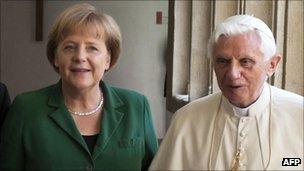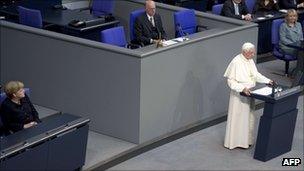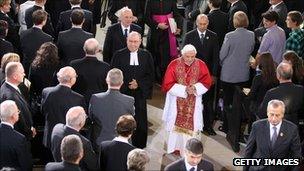Pope Benedict in Germany: Pontiff's state visit home
- Published

Pope Benedict spoke to German politicians about their duty to serve the people
How do you put the Pope's return to his homeland into perspective? It is not like his first visit after he became Pope in 2005, when he was greeted jubilantly by a proud nation that saw him as a great German success. The atmosphere this time has been quieter.
It is true that there were about 9,000 protesters in Potsdamer Platz, but there were many more participants - more than 60,000 - in the Mass at the vast Olympic Stadium in Berlin.
And it is true that some members of parliament did boycott his speech to the Bundestag - but many more stayed, listened and then stood and applauded at the end.
Unlike previous returns, this is an official visit, with all the panoply and ceremony accorded to a head of state.
When Pope Benedict emerged from the Alitalia plane in Berlin, he stood at the top of the steps and listened to a 21-gun military salute as his first, incongruous act on this return to German soil.
History lesson
From there, everyone he met seemed like a reminder of the diversity and perhaps the difficulty for a spiritual leader in a secular state: President Christian Wulff is a divorced and remarried Catholic who is, accordingly, not allowed to participate in some parts of Catholic services; Chancellor Angela Merkel is the daughter of a Lutheran priest; Mayor Klaus Wowereit of Berlin is openly homosexual.

As he is making an official visit, Pope Benedict was invited to address the German parliament
In the midst of these differences, the Pope has stood out.
He went to the German parliament and gave a surprising speech which was political but above the day-to-day detail of specific issues.
And the Bundestag is in one of the most historically charged buildings, the Reichstag which was set ablaze in 1933 and then lay in ruins throughout the years of Communism until it was rebuilt as the parliament of a democratic, united Germany.
Pope Benedict stood at the centre of the newly built forum, under the modern dome, and delivered a cerebral discourse on politics and the duty of politicians.
"We Germans know from our own experience" what happens when power is corrupted, he said, describing Nazis as a "highly organised band of robbers, capable of threatening the whole world and driving it to the edge of the abyss".
But, he said, even under the Nazi dictatorship, resistance movements stuck to their beliefs at great risk, "thereby doing a great service to justice and to humanity as a whole".
Priest shortage

Pope Benedict has taken part in an ecumenical service in the German city of Erfurt
How did it go down? For some on the Left, it was just empty words. "The Pope who has nothing to say" was the headline in the Tageszeitung newspaper.
But elsewhere, there was approval. A range of newspapers praised the speech - a "great speech", was the verdict of the immensely popular Bild.
Throughout the four days of his visit, the Pope is scheduled to make 18 speeches or sermons.
More than a quarter of a million people have registered to take part in the Masses which he will celebrate.
So it is clear that he remains the leader of a church with an immense following in Germany.
The uncomfortable fact for him, though, is that it is a big but diminishing following. Last year, on official figures, 181,000 Catholics left the Church.
And there is a shortage of new candidates coming in to the priesthood. That has prompted calls from within for change.
Rainer Kampling, a Roman Catholic theologian at the Free University in Berlin, wants married men to be allowed to become priests.
He told the BBC that the shortage meant there might not be enough to administer the last rites on death beds.
"Nowadays it's hard to find one," he said. "We have not enough priests for the people.
"Of course, we have enough priests for the government of the church. This anybody can do. Nobody needs to be a priest of a Catholic church to look after money. But for the religious life, there are not enough priests".
Christian Weisner of the reform organisation "We are the Church" says: "I hope this pope is not only giving speeches but listening to the people in the parishes.
"But expectations are not very high. People don't expect too much from this pope. He is an old man on the side of tradition."
- Published22 September 2011
- Published13 September 2011
- Published2 May 2013
- Published13 September 2011
- Published21 August 2011